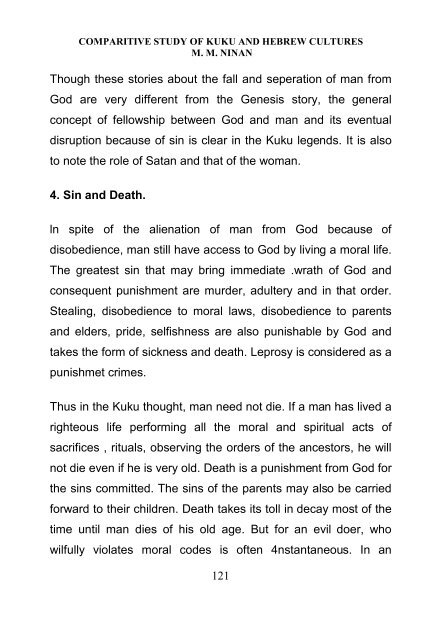Cultural Anthropology for Missions
Create successful ePaper yourself
Turn your PDF publications into a flip-book with our unique Google optimized e-Paper software.
COMPARITIVE STUDY OF KUKU AND HEBREW CULTURES<br />
M. M. NINAN<br />
Though these stories about the fall and seperation of man from<br />
God are very different from the Genesis story, the general<br />
concept of fellowship between God and man and its eventual<br />
disruption because of sin is clear in the Kuku legends. It is also<br />
to note the role of Satan and that of the woman.<br />
4. Sin and Death.<br />
ln spite of the alienation of man from God because of<br />
disobedience, man still have access to God by living a moral life.<br />
The greatest sin that may bring immediate .wrath of God and<br />
consequent punishment are murder, adultery and in that order.<br />
Stealing, disobedience to moral laws, disobedience to parents<br />
and elders, pride, selfishness are also punishable by God and<br />
takes the <strong>for</strong>m of sickness and death. Leprosy is considered as a<br />
punishmet crimes.<br />
Thus in the Kuku thought, man need not die. If a man has lived a<br />
righteous life per<strong>for</strong>ming all the moral and spiritual acts of<br />
sacrifices , rituals, observing the orders of the ancestors, he will<br />
not die even if he is very old. Death is a punishment from God <strong>for</strong><br />
the sins committed. The sins of the parents may also be carried<br />
<strong>for</strong>ward to their children. Death takes its toll in decay most of the<br />
time until man dies of his old age. But <strong>for</strong> an evil doer, who<br />
wilfully violates moral codes is often 4nstantaneous. In an<br />
121


















